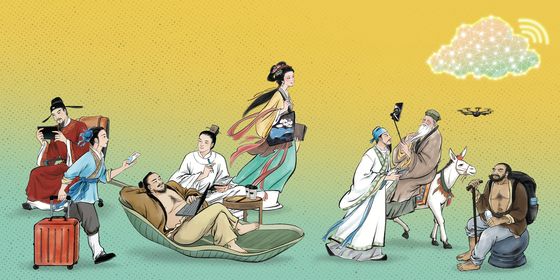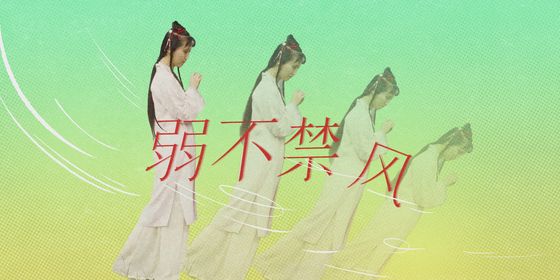Ancient idioms derived from buying and selling
Choice Chengyu is a regular column, examining interesting, unique or newsworthy examples of chengyu—four-character idioms or proverbs, derived from historical and mythical events.
November 11 used to be China’s Single’s Day, since the number “1” looks like a “bare stick,” a term in Chinese referring to the romantically unattached. But since 2009, the day has become a consumerist carnival as e-commerce platforms turned the “Double 11” into an annual shopping day with a wide variety of discounts. With more and more online platforms joining in, November 11 has become a grand event for people to “buy buy buy,” even as eager shoppers joke that they must “eat dirt” or “chop off their hands” to afford their sprees.
Though people didn’t have shopping festivals in ancient times, buying and selling has been a basic social activity for thousands of years, which not only contributed to splendid and extensive systems of ancient commerce, but also created many chengyu. Today, let’s have a look at several buying-related terms.
买椟还珠 To buy the case but refuse the pearls
Han Feizi (《韩非子》), a collection of works by the pre-Qin philosopher of the same name, told the story of a pearl seller from the State of Chu. He placed his pearls in a lavishly adorned case for sale in the State of Zheng, where a buyer kept the glittering case but returned the much more valuable pearls to the seller. The story was summarized into this chengyu to describe people who lack acumen or a sense of discrimination.
If you memorize every sentence of an article without interpreting its essence, you are buying the case but refusing the pearls.
Dú yí piān wénzhāng rúguǒ zhǐ jìzhù zìjù ér bù lǐjiě néihán, nà wúyì yú mái dú huán zhū.
读一篇文章如果只记住字句而不理解内涵,那无异于是买椟还珠。
郑人买履 A person from Zheng State buys shoes
It seems that people of the State of Zheng really didn’t know how to buy stuff. Another story in Han Feizi describes another Zheng native who measured the size of his feet and wrote it down before going to buy a pair of shoes. But when he arrived at the market, he found that he forgot to bring the note with him, so he decided to go home to pick it up. Someone suggest he try on the shoes directly with his feet, but he said he believed in the number he had measured more than his own feet.
This chengyu is used to satirize people who handle things strictly by the book while ignoring the reality.
We should start from reality, and not be unrealistic like the Zheng person who buys the shoes.
Wǒmen yào cóng shíjì chūfā, búnéng zhèngrénmáilǚ, wǎnggù xiànshí.
我们要从实际出发,不能郑人买履,罔顾现实。
买牛卖剑 To buy cattle and sell the sword
Originating from the Book of Han (《汉书》), this idiom describes people laying down their weapons and settling to tend their farms, indicating that war is over and a peaceful era has begun. It can also refer to people who give up an evil way of life and return to the path of virtue.
博士买驴 A scholar buys a donkey
Boshi was an official position in ancient times, often occupied by well-learned scholars. In the book The Yan Family’s Rules (《颜氏家训》), a story is recorded: A boshi went to buy a donkey. He drafted a contract of three pages about the purchase, but never even mentioned the animal.
This idiom means “to write profusely but irrelevantly.”
When you write an article, get straight to the point. Don’t speak at great length without actually saying anything, just like the boshi buying a donkey.
Xiě wénzhāng yào kāimén jiànshān, búyào bóshì mǎilǘ, búzhuó biānjì de kōngfā yìlùn.
写文章要开门见山,不要博士买驴,不着边际地空发议论。
千金买骨 A thousand pieces of gold to buy bones
In the Warring States Period, King Zhao of the State of Yan was eager to recruit talented advisers. His adviser Guo Wei provided him with a very creative idea by telling a story: An emperor in the old days wanted to buy a swift horse, but could not find one for three years. One day, an official brought the bones of a dead swift horse back with a thousand pieces of gold in the name of the emperor. The emperor was very angry, but soon many people went to the emperor trying to sell their swift horses, believing that if the emperor spent so much money on a dead horse, he would pay even more for a living one. Then Guo said, “If you show your respect to me, people wiser than me will believe that you will treat them even better.”
King Zhao accepted his suggestion. He built Gold Terrace (黄金台) in modern-day Hebei for Guo as a show of respect. Unsurprisingly, many famous minds came to the State of Yan to pursue the king’s favor. Guo’s story then became a chengyu.
千金买笑 A thousand pieces of gold to buy a smile
Not all the rulers respected talent as King Zhao of Yan did. This chengyu, which is a metaphor for paying a high price for something trivial, comes from the Western Zhou dynasty. It was said that King You had a favorite concubine, Baosi, who was breathtakingly beautiful but seldom smiled. King You promised a thousand taels of gold for an idea that could make her laugh. Then an official proposed using the beacon towers—at that time, the defenders would light fires on the beacon towers when enemies approached so that the neighboring princes would send their troops to help.
King You agreed to the plan. He ordered men to light the fire, and sat on the top of a high mountain with Baosi, waiting for the troops. Quickly troops arrived from every corner, only to be told that there were no enemies. Baosi laughed after seeing all the troops come and return in such a hurry. King You was very glad, and did the same thing several times, making the princes angry. Finally, when enemies truly came, the princes didn’t believe it and King You was killed. As for Baosi, some said she was killed together with King You, while some said she was captured.
Cover image from VCG












